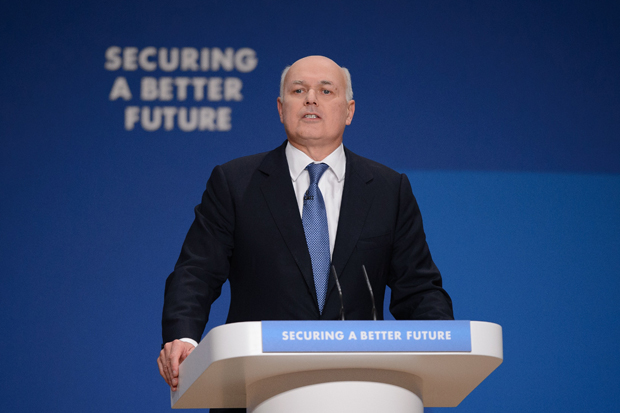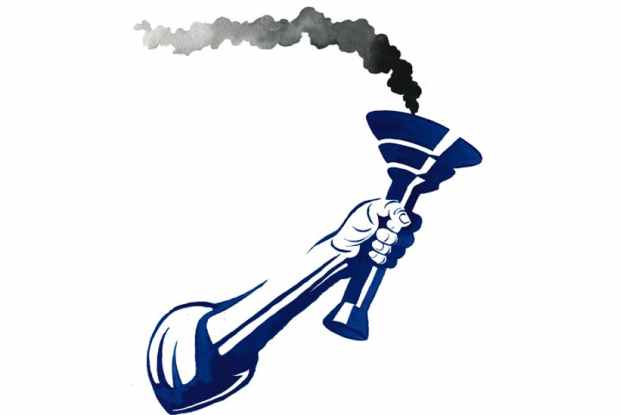‘You did this,’ David Cameron repeatedly declared to Tory donors as he reeled off a list of the government’s achievements at the Black and White ball on Monday night. Three months before the general election, the atmosphere at this lavish fundraiser at the Grosvenor House Hotel was self-congratulatory and more upbeat than perhaps it should have been, considering the polls. As guests made ever larger bids in the fundraising auction, the mood was one of confidence that the Tories would be in office again after May. By the end of the evening, there was heady talk of a Tory majority.
But it is not the donor class who will determine whether the Tories have the seats to govern alone. Rather, it is lower middle-class and skilled working-class voters, the so-called C1s and C2s, and especially those in the marginals of the West Midlands and the north west.
The last time the Tories passed the magical 326-seat mark, 23 years ago, John Major won a majority of lower middle-class votes. But at the last election, there was only a 3 per cent swing among this group to the Tories. The party’s support has fallen among these voters in this parliament, down to 30 per cent in the last ICM poll. With the skilled working class, the story is even worse for the Tories: they are in third place with C2s, behind both Labour and Ukip.
This weakness is one reason why it is so hard to see the Tories winning a majority. It all adds to the current Westminster consensus that the chances of either of the main parties winning outright is receding. Both Labour and the Tories remain in the low to middle thirties in the polls. In this war of the weak, each is pinning their electoral hopes on the other party’s flaws.
There are those who break from the consensus that no party can win a majority. David Cameron is convinced that, as in the 1992 election campaign on which he cut his teeth, there will be a late rally for the Tories as voters minds’ are focused by the prospect of Miliband as prime minister.
The problem with Cameron’s theory is that the Tories won’t know whether he’s right until it is too late. At the moment, the polls show the Tories drawing level, but several members of the Downing Street operation had hoped that they would have a clear lead by now. They are also not making progress at a sufficient pace to secure a majority — unless something dramatic happens. Of course, events could intervene on the Tories’ behalf. If Greece left the euro, something that those in the government who are monitoring the situation reckon is a one in four chance, it would drive the economy up the agenda and make the Tories’ warnings of ‘chaos’ seem far more real. In these circumstances, it is quite conceivable that they might win outright.
But without some external trigger, the Tories are going to need something to enable them to break out of the inch-by-inch trench warfare of British politics. The Tory policy offer for the election is still being put together. Jo Johnson, the head of the No. 10 policy unit and Boris’s younger brother, is leading the work on it. Johnson, a former FT journalist, is a clever, well-organised thinker. But he is not particularly radical or ideological. However, the Tory manifesto will need things in it that can capture voters’ imaginations and win over those crucial C1 and C2 voters.
So, where will the game-changer come from? The most obvious candidate is a bold plan being hatched by Iain Duncan Smith to extend the right to buy to the 2.5 million housing association homes. At present, housing association tenants are offered very limited discounts and can only buy properties that their association has acquired since 1997. Offering them a substantial discount to buy their own homes — under right to buy, the discount can be as much as 70 per cent — would show that the Tories remain a party committed to aspiration and a property-owning democracy.
A more radical version of this scheme is being discussed, whereby every housing association property is transferred to its tenant if they have been in work for a year. The government would receive a proportion of the profits when the property is sold on. The money raised would then be used to fund the building of more social housing, which would be spread out rather than concentrated in large estates.
However, the Tory high command does not seem that enthusiastic about Duncan Smith’s idea. One of those who will help determine what goes in the manifesto cautions that it is a ‘blunt instrument of a policy’. There is also concern that, especially in its more radical form, it would irritate people renting in the private sector who can’t afford to buy their own home. They would be excused for wondering where their reward was for having worked hard and paid rent all those years.
Such objections echo those voiced about the original Thatcher right to buy scheme. As Charles Moore, her official biographer, records, she was worried that if the discount offered to council house tenants was too great it would annoy what she called ‘our people’, who were buying their homes on the open market and at full price. But, as Thatcher came to realise, these objections were ‘narrow and unimaginative’. If the Tories were to make Duncan Smith’s policy part of their 2015 manifesto, they would electrify the election. They would show that — in the tradition of Macmillan and Thatcher — the party remains committed to expanding home ownership.
Three months from polling day, the Tories are level in the polls. This is not a bad position for incumbents to be in, and suggests that they may still be the largest party in the Commons after the election. But if the Tories are to break the stalemate that is British politics, they will need to come up with a truly brave offer. Over and above any concerns about Miliband and Balls and the economy, they must give people a positive reason to vote for them.
Got something to add? Join the discussion and comment below.
Get 10 issues for just $10
Subscribe to The Spectator Australia today for the next 10 magazine issues, plus full online access, for just $10.
You might disagree with half of it, but you’ll enjoy reading all of it. Try your first month for free, then just $2 a week for the remainder of your first year.















Comments
Don't miss out
Join the conversation with other Spectator Australia readers. Subscribe to leave a comment.
SUBSCRIBEAlready a subscriber? Log in